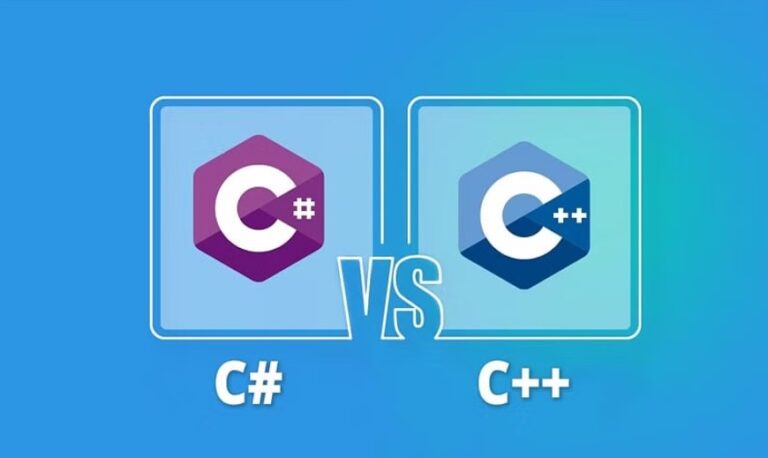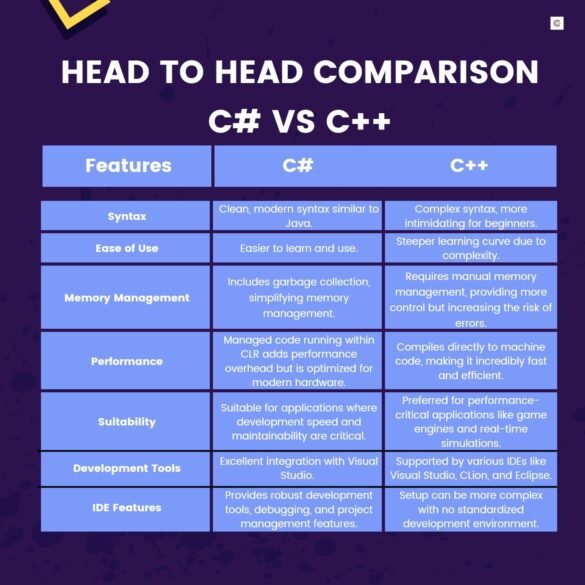Introduction
Overview of C++ and C#
In the realms of software development, C++ and C# stand out as two powerful programming languages that cater to different needs and environments. C++ is often revered for its performance and control over system resources, making it a staple in system-level programming, game development, and applications where speed is critical. On the other hand, C# serves as a versatile language primarily associated with the Microsoft ecosystem, excelling in desktop and web application development through its robust framework.
Some key distinctions include:
- C++
- Low-level programming capabilities
- Manual memory management
- Strong use in game engines and high-performance applications
- C#
- High-level programming language
- Managed runtime environment (CLR)
- Common in enterprise applications and web services
Importance of Choosing the Right Programming Language
Choosing between C++ and C# can significantly impact project outcomes. The right language can enhance productivity, streamline development processes, and align well with the project’s goals. For instance, selecting C# for developing a web application could lead to quicker development times thanks to its extensive libraries and frameworks.
Therefore, assessing the project requirements, team skills, and long-term maintenance can provide clarity in making the right choice. So, whether it’s a robust system application or a user-friendly web interface, understanding the nuances of these languages is crucial before diving in.

Comparison of C++ and C#
History and Evolution
Understanding the history of C++ and C# offers valuable insights into their distinct characteristics. C++ emerged in the early 1980s, created by Bjarne Stroustrup. It evolved from the C programming language to support object-oriented programming, gaining immense popularity for systems software and high-performance applications. Conversely, C# was developed by Microsoft in the early 2000s as part of its .NET initiative, designed to be modern and user-friendly, effectively bridging the gap between simplicity and powerful performance.
Syntax and Language Features
When it comes to syntax, C++ can be quite intricate, reflecting its lower-level capabilities. Developers often navigate complex features such as pointers and manual memory management. C#, on the other hand, presents a cleaner and more modern syntax, promoting ease of use and readability, which can appeal to new developers.
Key features include:
- C++
- Supports multiple programming paradigms (procedural, object-oriented)
- Extensive use of templates for generic programming
- C#
- Strongly typed language with garbage collection
- Built-in features for asynchronous programming
Performance and Efficiency
In terms of performance, C++ generally outshines C# due to its ability to interact directly with hardware and system resources. This capability makes C++ the go-to language for applications where efficiency is paramount, such as video games and real-time systems.
C#, while slightly slower, compensates with features like a rich ecosystem of libraries and a managed runtime environment, which significantly eases development at the cost of some performance. As a developer, choosing between these languages ultimately depends on the project’s requirements—whether performance or ease of development takes precedence.

Applications and Use Cases
Industry Adoption of C++
C++ has cemented its place in various industries due to its unmatched performance and control. One could say it has become the backbone of sectors where efficiency is non-negotiable.
Some notable areas where C++ is widely adopted include:
- Game Development: The gaming industry relies heavily on C++ for developing graphics-intensive applications, providing real-time performance and control over hardware, as seen in popular game engines like Unreal Engine.
- System Software: Operating systems and file systems often utilize C++ due to its ability to manage resources effectively, exemplified by examples like Windows and Linux.
- Embedded Systems: Devices ranging from automotive controls to medical devices frequently employ C++ to ensure real-time capabilities and efficient memory usage.
Common Uses of C#
C# shines brightly in enterprise application development, thanks to its full integration with the Microsoft ecosystem. Developers favor C# for a plethora of applications:
- Web Applications: Utilizing ASP.NET, C# has become a go-to for building scalable web applications with robust back-end systems.
- Desktop Applications: Applications for Windows are predominantly developed using C#, allowing for a seamless user experience with Windows UI frameworks, such as WPF and WinForms.
- Mobile Development: With frameworks like Xamarin, C# enables developers to build cross-platform mobile applications, which can save time and resources.
Both languages have their strengths, and knowing where they excel can guide developers in choosing the right tool for their projects.

Development Ecosystem
Tools and Integrated Development Environments (IDEs)
Diving into the development ecosystems of C++ and C#, one quickly realizes the importance of effective tools and Integrated Development Environments (IDEs). For C++, popular IDEs include:
- Visual Studio: Renowned for its powerful debugging features and extensive support for C++ libraries, this IDE facilitates development for various platforms.
- CLion: A cross-platform IDE from JetBrains that streamlines the development process with superior coding assistance and refactoring capabilities.
C#, on the other hand, is heavily tied to the Microsoft ecosystem, making Visual Studio a compelling choice. It supports advanced features such as IntelliSense, integrated testing tools, and Git integration, which significantly enhance the developer experience.
Libraries and Frameworks Support
The richness of libraries and frameworks can often define the speed and efficiency of development. C++ boasts a wealth of libraries like:
- Boost: Extending functionality with components for tasks ranging from linear algebra to multi-threading.
- Qt: A powerful framework for developing cross-platform applications with stunning interfaces.
For C#, the .NET framework is a game-changer, providing robust libraries for web services, database interaction, and user interface development. The versatility of these tools fosters rapid development and allows developers to focus on building quality applications efficiently, ensuring they have the right support no matter which language they choose.

Learning Curve and Community Support
Difficulty Level Comparison
When it comes to learning programming languages, the difficulty level can significantly affect a developer’s journey. C++ is often regarded as a language with a steep learning curve. Factors contributing to this complexity include its intricate syntax, manual memory management, and advanced features like templates and pointers. Many newcomers may find themselves frustrated by these hurdles; however, mastering C++ can lead to unparalleled control and performance in applications.
Contrastingly, C# is generally perceived as more accessible, especially for beginners. The presence of managed code, garbage collection, and a cleaner syntax offers a more user-friendly experience. Many developers, myself included, appreciated how quickly they could grasp essential concepts in C# and start building applications, often leading to a gratifying learning experience.
Online Resources and Community Engagement
Both languages boast vibrant communities rich in resources. C++ developers can tap into:
- Forums like Stack Overflow: To seek help on intricate problems.
- Books and tutorials from authors like Bjarne Stroustrup: Who provide insights from the language’s creator.
C# developers benefit from:
- Microsoft’s official documentation: A treasure trove of resources directly from the source.
- Active GitHub repositories: Engaging in open-source projects to improve skills and learn from others.
Engagement with these communities not only fosters knowledge sharing but also builds connections that are invaluable for personal growth and career development.

Job Opportunities and Salary Trends
Demand for C++ and C# Developers
As the tech industry continues to evolve, the demand for skilled developers remains consistently high. C++ developers are often sought after for roles in fields that require high-performance applications, such as game development, system programming, and finance. Companies like Electronic Arts and major hardware firms often list C++ as a key skill, as the need for efficient and responsive software becomes increasingly crucial.
In contrast, C# developers are in high demand primarily within enterprise environments. With the rise of web applications, cloud computing, and mobile apps, C# remains a popular choice, especially for companies leveraging the Microsoft stack. Organizations such as Microsoft and many startups value C# expertise, resulting in a robust job market.
Compensation Comparison
When it comes to compensation, developers working with C++ generally command higher salaries due to the specialized skills required and the complexity of the projects. On average, C++ developers earn around $93,000 annually, while C# developers typically earn about $85,000.
Salary variations can depend on factors like location, experience, and specific industry demands. Climbing the ranks in either field often leads to lucrative opportunities, so understanding these trends can help aspiring developers navigate their career paths effectively.

Decision Factors and Considerations
Project Requirements
When deciding between C++ and C#, it’s essential to consider the specific requirements of your project. For instance, if you are developing a high-performance game or complex system software, C++ shines with its low-level programming capabilities and efficient memory management. Many developers find that using C++ allows them to extract the utmost performance from hardware, which is crucial in resource-intensive applications, especially in real-time environments.
Conversely, if the goal is to create a web application or an enterprise solution, C# typically offers a more streamlined approach. With its robust frameworks like ASP.NET, C# facilitates rapid development, making it the preferred choice for businesses looking to deliver applications quickly without sacrificing quality.
Personal Preferences and Skill Level
Personal preferences and skill levels play a pivotal role in this decision-making process. Those who enjoy fine-tuning performance aspects and have the patience to deal with complex syntax might be drawn to C++. Meanwhile, developers looking for a more straightforward learning curve and a faster path to productivity may favor C#.
Ultimately, personal experience, comfort with specific features, and long-term goals can significantly influence the decision, making it crucial to weigh these factors before diving into development.

Conclusion
Recap of Differences Between C++ and C#
In concluding our exploration of C++ and C#, it’s essential to recap the key differences that set them apart. C++ is a powerful, high-performance language well-suited for system-level programming and applications that require deep hardware interaction. Its strengths lie in manual memory management and extensive control over system resources, making it the go-to choice for gaming engines and real-time systems.
Meanwhile, C# offers a user-friendly experience with its rich framework support, making it ideal for web and enterprise application development. The language’s ease of use, combined with features like garbage collection, provides a robust platform for rapidly building applications.
Making an Informed Decision
Ultimately, the decision between C++ and C# hinges on your specific needs and preferences. Consider the project requirements, your existing skill set, and the types of applications you want to develop. Whether you’re aiming for high-performance systems with C++ or seeking to build accessible and scalable applications with C#, both languages offer unique advantages.
Taking the time to reflect on these factors will help you make an informed decision, ensuring that your programming journey aligns with your goals and aspirations in the tech industry.

